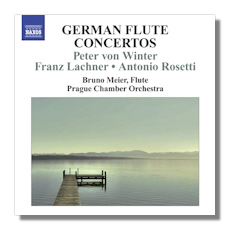
The Internet's Premier Classical Music Source
Related Links
-
Lachner Reviews
Rosetti Reviews
Winter Reviews - Latest Reviews
- More Reviews
-
By Composer
-
Collections
DVD & Blu-ray
Books
Concert Reviews
Articles/Interviews
Software
Audio
Search Amazon
Recommended Links
Site News
 CD Review
CD Review
German Flute Concertos

- Peter von Winter:
- Flute Concerto #1 in D minor
- Flute Concerto #2 in D minor
- Franz Lachner: Flute Concerto in D minor
- Antonio Rosetti: Flute Concerto in E Flat Major, RWV C19
Bruno Meier, flute
Prague Chamber Orchestra
Naxos 8.570593 DDD 80:04
None of these works have been recorded before, and those who like the flute, or undemanding concertos from the Classical and Romantic eras, will derive much pleasure from this well-filled CD. Even though three of these concertos are a minor key, there's no real Sturm und Drang here. Whether you put it in the background or in the foreground, this music elicits sighs of satisfaction and pleasure.
Peter von Winter (1754-1825) is not a familiar figure. He and Mozart were acquainted, and he even composed a sequel of sorts to The Magic Flute. In 1798 he became Kapellmeister to the court chapel in Munich, which is where his life ended 27 years later, although in between he worked in Paris and London. His Flute Concerto #1 is more like a concertino, given that it is relatively short, and in one movement – albeit with several tempo changes. Its air of light pathos is attractive. The second concerto follows the more usual three-movement pattern, except in this concerto, the cadenza comes in the slow movement. Like Mozart's, Winter's music flows with the facility of water, although it lacks the former composer's genius. Not just in the solo parts, Winter's writing for wind instruments is particularly pleasant and idiomatic.
The short-lived Rosetti (né Anton Rösler) was born around 1750 and died in 1792. He too served as a Kapellmeister. In his second such post, he was fortunate to be surrounded by house musicians, which probably explains why he wrote close to 60 concertos. The Flute Concerto recorded here also exists in a similar (but not identical) version that the composer prepared for horn, so it might be familiar to some listeners. The healthily active opening movement sounds like the sun bursting out from behind a cloud, so used are we to the key of D minor at this point in the CD! In the succeeding Adagio ma non tanto, the orchestra bears its griefs stoically, and the flute encourages it to cheer up. The too-brief Rondo brings the concerto to a close with almost childlike innocence.
Franz Lachner (1803-1890) was a colleague and supporter of Franz Schubert, and later in life, founder of the Munich court orchestra, which he conducted. (Conflicts with Richard Wagner and his cronies caused him to surrender that post to Hans von Bülow in 1868.) His Flute Concerto, which dates from 1832, also is in one movement, but it is less obviously sectional than Winter's Concerto #1. For a flute concerto, there's a surprising amount of quasi-martial huffing and puffing – all of it in good fun, apparently, despite the minor key.
Much is made of the fact that Bruno Meier plays a 14-carat gold flute; that might be, but it is his golden sound that is more impressive. He and the Prague Chamber Orchestra make a somewhat gentle, even staid impression in these four concertos. Meier's understatement suits this repertory's fragile charms well, however, so no harm is done. The Prague Chamber Orchestra plays stylishly throughout. The long booklet note (originally in German, but translated into good English) is a model of its kind, and so it the engineering.
Copyright © 2009, Raymond Tuttle




















